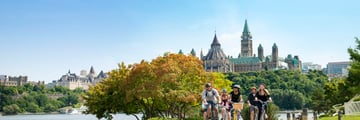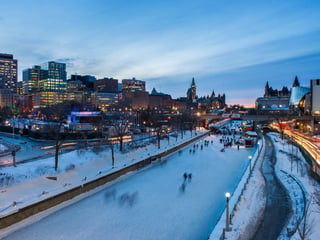Top 10 things to do in Ottawa
Ottawa is a city for all seasons and all people. With so much to see and do, we thought we’d make it easier for you to decide on how to fill your time whilst in this charming capital city by compiling our Top Ten. Here goes!
10. Take a tour - any way you want
Ottawa isn’t a large city, its population is a third of the size of Toronto and a tenth of London, but it really does pack a punch, and the great thing about sightseeing in Ottawa is the myriad ways of doing so. You can bus, cycle, walk, eat, drink and cruise your way around the city to take in the sights. The most traditional city tour is a Hop-on Hop-off bus, which is a great way to get your bearings. With a compact city centre, a two-hour guided cycle tour will take in the main sights as well as get you out and about in the fresh air. You could opt for the Historical Highlights Walking Tour taking in the glorious buildings…or for those who like to be scared there is a haunted walk tour most evenings, where ghost stories are shared by lantern light. A ByWard Market food tour will introduce you to all the tastes of the city, including the iconic Beaver Tail (more later). If you’re a craft beer fan, then we can book you onto a brewery tour - you will be guided through the past of beverage making in Ottawa, from hidden beer tunnels to cliffside lager caves, whilst someone else does the driving. Saving the best ‘til last, you can also take a boat cruise to see the sights at a leisurely pace, either along the historic Rideau Canal or along the glorious Ottawa River.

Cycling tour – credit: Ottawa Tourism
9. Eat your way around the city
Ottawa has a wonderful diverse culinary scene, from food trucks to fine dining, as well as dozens of craft breweries, distilleries and wineries. With more than 1,000 farms within the city limits, the restaurants have a bounty of fresh produce at their fingertips. 1 Elgin showcases fresh flavours and ingredients of Canada, with a very cool vibe located in the National Arts Centre. Noted as one of Canada's best restaurants, Riveriera Ottawa is a treat. Situated just across from Parliament Hill, this is the place to enjoy creative Canadian cuisine, with elevated takes on classics like shrimp salad cocktails and dry-aged steaks.
At ByWard Market you’ll find an eclectic mix of eateries, including the original kiosk of the world-renowned BeaverTails - a deep-fried dough pastry stretched to look like the shape of a beaver's tail. Its toppings are either sweet or savoury....from whipped cream with crumbled Oreos to garlic butter and cheese, but the classic BeaverTail is dipped in a combination of cinnamon and sugar.
To sample the best of the city, we can book you onto a foodie tour to explore food shops, farmers’ markets and restaurants. Make sure you bring your appetite with you!

A selection of BeaverTails – credit: BeaverTails
8. Zipline across two provinces
The only zipline in the world that connects two provinces – “Interzip” takes you on a panoramic journey 37 m over the Ottawa River at speeds of up to 40 kph between Ontario and Quebec. As the saying goes, a picture says a thousand words, so we’ll just park this here!

Interzip – credit: Ottawa Tourism
7. Discover ByWard Market
A historic farmers' market and shopping district by day, a favourite gathering place of restaurants and clubs by night, this is a neighborhood every visitor to Ottawa should visit.
Here you’ll find market stalls and specialty food shops selling Canadian cheese and maple-infused chocolate with every other taste in between, surrounded by colourful street art. A treat for fashionistas and souvenir shoppers alike, you’ll also find unique boutiques with handmade crafts and clothes by local designers. It’s renowned for its collection of local artisanal products, one-off jewellery, artwork and home furnishings.
At night you’ll find atmospheric pubs where you can savour local brews and sleek lounges to enjoy handcrafted cocktails and international wines. It’s a great live-music locale with the area’s numerous bars and clubs offering up acoustic performances to energetic bands to DJs with their latest set, you’ll find your scene here.

ByWard Market – credit: Ottawa Tourism
6. Skate on the worlds longest ice rink
From January to March, the Rideau Canal turns into the Rideau Canal Skateway, which is the world’s largest skating rink, covering just under 5 miles. Running from downtown and winding its way to Dow’s Lake, there are several places to hire skates and the route is dotted with BeaverTail stands for sweet treats and hot drinks. Don’t worry if you’re a non-skater, you’re welcome to walk or shuffle along the edges of the Skateway (safely away from the skaters), or on the pathways alongside the Rideau Canal, Ontario’s only UNESCO World Heritage Site.
Fun fact - The ice must be 30cm in thickness for the Rideau Canal Skateway to open. This means there needs to be about 10-14 straight days of -10 to -20 degree Celsius days in order for the quality of the ice to meet the standards of safe skating.

Rideau Canal Skateway – credit: Ottawa Tourism
5. Experience the Rideau Canal
Outside of the icy winter months, the Rideau Canal is filled with boats and kayaks, winding through the heart of Ottawa before connecting with the Ottawa River through dramatic stepped locks next to Parliament Hill. This UNESCO World Heritage Site was built in the middle 1800’s largely for strategic military purposes at a time when Great Britain and the United States vied for control of the region.
The best way to experience this historic waterway is by boat, and we can now book you onto a wonderful guided cruise onboard a 100% electric boat, to enjoy an hour and a half watching the world quietly glide by, whilst learning about the history of the canal and the buildings that line its banks.

Rideau Canal – credit: Ottawa Tourism
4. Visit some of the best museums in the world – Part 1
Here’s an eye-opening fact: Ottawa is home to seven of Canada’s nine national museums! Take your pick this whistle-stop tour….
Starting with the ever-popular Canadian Museum of History, it houses world’s largest collection of totem poles, plus the signature exhibition - The Canadian History Hall, showcasing the events, personalities and historical currents that have shaped Canada. Canada's rich military history is presented at the Canadian War Museum, through artifacts, personal stories, artwork, photos and interactive presentations, and you can chat with a veteran to let history come alive. All ages will enjoy the Canada Aviation and Space Museum, where you can explore the expansive, hangar-like building covering everything from the beginnings of flight to the today’s aerospace industry, where you get to sit in cockpits and try out flight simulators.
Another popular choice is the Canadian Museum of Nature, housed in a striking historic building. Inside you’ll find dinosaur replicas, whale skeletons, mammals and birds. The Canada Goose Arctic Gallery offers a window to the Arctic’s geography, climate, people and wildlife.
Culture vultures will enjoy the National Gallery of Canada. A beautiful modern building is home to the most comprehensive collection of Canadian art, including a large number by the Group of Seven and strong collections of Indigenous, Asian, and International works.
Last but not least, there is the Canada Science and Technology Museum with the ZOOOM Children’s Innovation Zone a family favourite, and the Canada Agriculture and Food Museum including a working farm.

National Gallery of Canada – credit: Ottawa Tourism
3. Visit some of the best museums in the world – Part 2
There is a quirkier side to Ottawa’s museums and historic sites….our favourite is the Diefenbunker: Canada’s Cold War Museum - a real bunker-turned-museum. It was built between 1959 and 1961 to shelter Canadian government officials in the case of a nuclear attack, it is a perfect time capsule of a bye gone era. Although former Prime Minister John Diefenbaker never visited his “Diefenbunker”, Kevin one of our North America Travel Specialists has visited; "Fascinating - a massive former underground military complex in a field in the middle of nowhere - a surreal experience!”
Other sites of national importance include the historic Fairmont Château Laurier - the first in a series of hotels constructed by the Grand Trunk Pacific Railway Company; Rideau Hall - historic home of the Governor General of Canada; and Laurier House National Historic Site - where famous prime ministers lived.

The Diefenbunker museum – credit: Ottawa Tourism
2. Go whitewater rafting...through the city
We can’t think of anywhere else in the world you’d be able to do this, but in Ottawa you can enjoy a rafting trip along the Ottawa River which includes the three wild rapids in the city section! Leaving from picturesque Britannia Beach, the three hour trip features these rapids plus spectacular views of the city, with opportunities to swim. Enjoy the sights and learn about the rich history and geography of the capital, as you paddle along the river.

Rafting on the Ottawa River – credit: Explore David-Jackson
1. Parliament Hill
The most-visited of Ottawa’s attractions, this is the heart of the city. The parliament buildings are made up of three Gothic-style buildings sitting on the 170-foot bluff overlooking the Ottawa River. It’s the seat of Canada's federal government as well as the setting for national celebrations the year round. If it’s a sunny day grab some drinks and snacks and watch the world go by in this majestic setting.
You can take a guided tour free of charge of the Senate, Hour of Commons, East Block and Parliament: The Immersive Experience, but make sure you reserve your tickets in advance.
Any of the city tours will give you great views of the majestic parliament buildings from various viewpoints, but it’s well worth spending some time on The Hill, as it is known locally, to take in the splendour and enjoy some local colour.

Parliament Hill – credit: Ottawa Tourism
Recommended holidays








